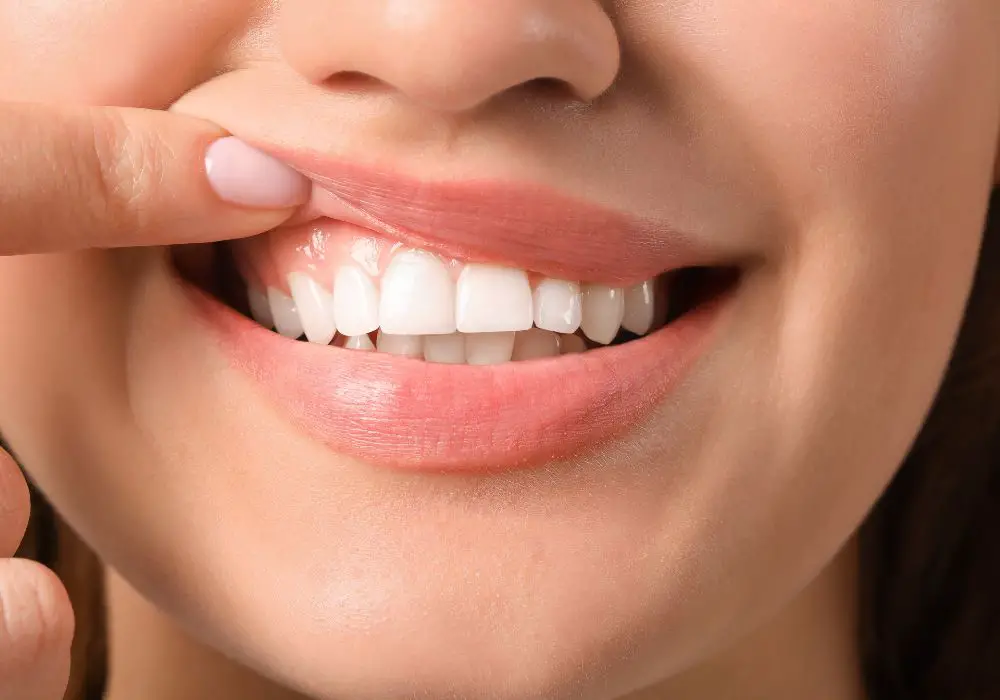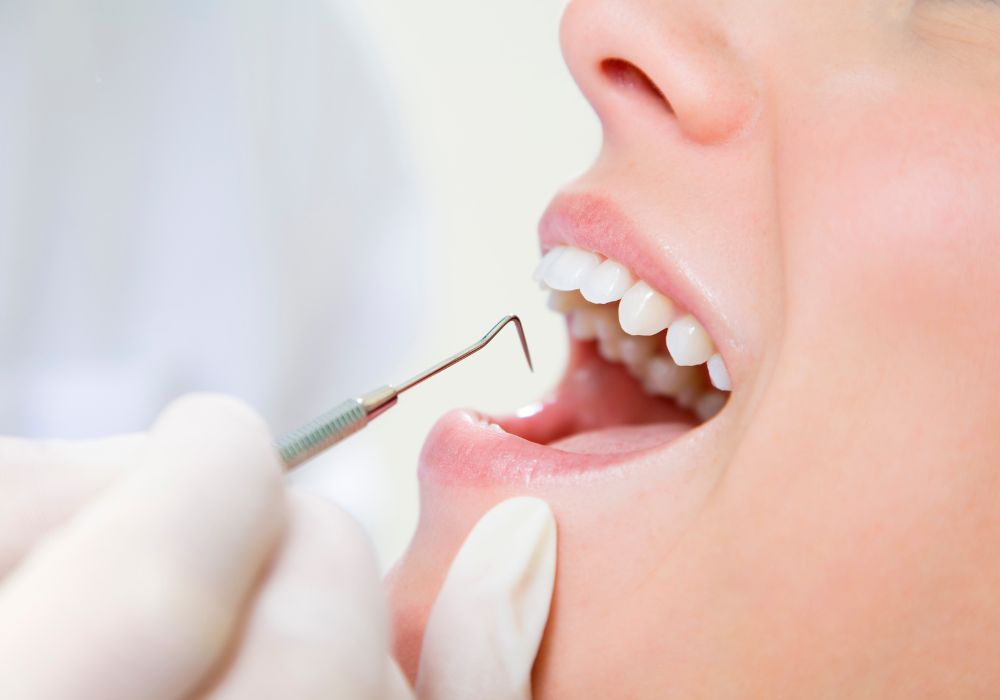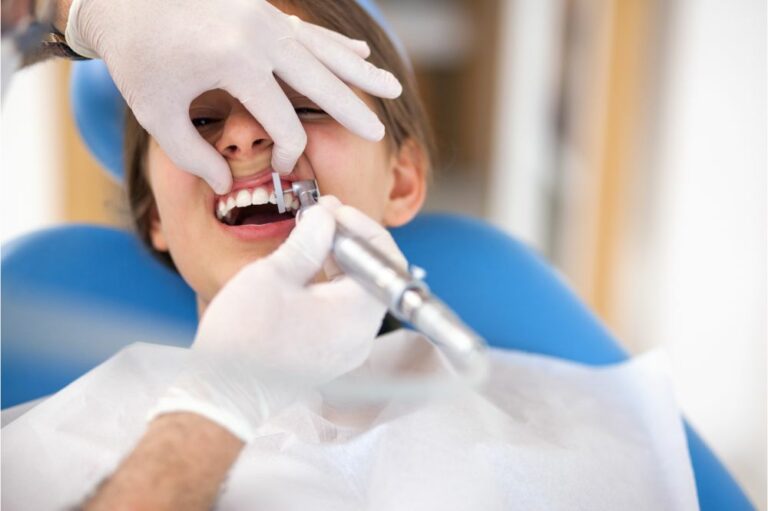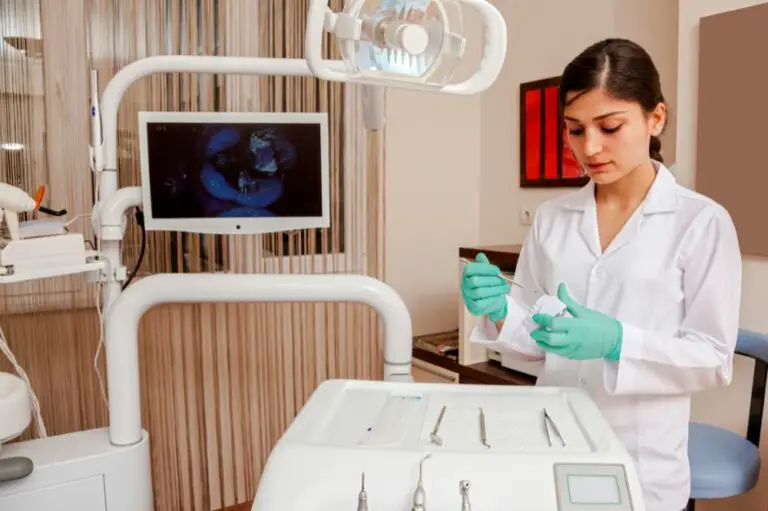Receding gums can be worrying, but there are treatment options available to help regrow lost gum tissue and restore your smile. This comprehensive guide will cover what you need to know about receding gums, including potential causes, consequences, whether gums can grow back, and the most effective treatment options.
What Causes Receding Gums?
Gum recession affects nearly half of adults to some degree. The gums are the soft pink tissue that surrounds and supports the teeth. When they recede, or pull away from the teeth, pockets form that allow more tooth surface and roots to become exposed.
Several factors can contribute to receding gums:
- Aggressive Tooth Brushing – Brushing too vigorously with a stiff brush or abrasive toothpaste rubs away gum tissue. Brushing from side-to-side rather than up-and-down motion also wears away gums.
- Poor Oral Hygiene – Plaque left on the teeth hardens into tartar that irritates gums. Bacteria in plaque cause gum inflammation and infections like gingivitis, which can destroy gum tissue if left untreated.
- Heredity – Some people are simply prone to thinner gums or abnormal tooth alignment that make them more susceptible to recession even with good care. About 30% of the population seems genetically predisposed.
- Periodontal Disease – Chronic gum infections damage the connective tissue and bone anchoring teeth to the gums. Left unchecked, the gums can pull away.
- Grinding and Clenching – Putting excessive biting force on teeth stresses the attachment fibers between teeth and gums. This can cause them to loosen and recede.
- Smoking/Tobacco Use – Chemical irritants in tobacco products increase gum recession. Smoking also reduces blood flow needed for healthy gums.
- Cavities and Fillings – Untreated decay under the gumline can destroy connecting fibers and supporting bone, allowing gums to recede. Old defective fillings can also contribute to receding gums.
- Crooked Teeth or Misalignment – Teeth that don’t come together evenly can cause some gums to take the brunt of the biting force and eventually recede.
- Hormonal Changes – Puberty, pregnancy, and menopause cause fluctuations in hormones that can increase gum sensitivity and recession.
- Mouth Piercings – Having a tongue or lip piercing that chronically rubs against the gums can wear the tissue away.
- Aggressive Flossing – Improper flossing with too much force and snapping floss up into the gums can damage the gum tissue.
What Problems Can Receding Gums Cause?
Receding gums should never be ignored because they rarely get better on their own and often indicate advancing gum disease. Some of the potential problems include:
- Tooth Sensitivity – Once the root surfaces are exposed, sensitivity to hot and cold foods or drinks is common. Even breathing cold air can be painful.
- Tooth Decay – Gum recession creates pockets that are hard to keep clean and allow plaque to build up near the tooth roots and newly exposed enamel. This greatly increases decay risk.
- Abscesses – Severe untreated gum recession enables infection to spread to the roots beneath the gumline, forming pus-filled abscesses. This can lead to tooth loss.
- Additional Gum Loss – More of the gum tissue can gradually recede further up the teeth toward the crowns as gum disease progresses.
- Bone Deterioration – The underlying alveolar bone that anchors teeth can also be lost as the gums recede, causing loose teeth.
- Tooth Loss – In advanced cases with excessive bone loss, the teeth can eventually loosen completely and require extraction.
- Difficulty Eating – Bone loss and loose teeth make chewing difficult. It may also become uncomfortable to eat or drink hot and cold foods.
- Poor Appearance – Severe gum recession is unsightly with long, exposed tooth roots that can detract from an attractive smile.
Clearly, allowing gum recession to worsen without seeking treatment often leads to much greater oral health issues down the road. Catching it early provides the best chance to reverse gum loss.
Can Receding Gums Grow Back?

The prospect for gum regrowth depends on the severity of the recession:
- Mild – Receded 1-2mm. In these cases, gently brushing, flossing, and using antiseptic rinses can sometimes allow the gums to reattach to the teeth. Quitting smoking also aids gum regrowth.
- Moderate – Receded 3-4mm. Some procedures like pinhole surgery may help regrow enough gum tissue to cover the exposed roots. Gum grafts are often needed for complete root coverage.
- Severe – Receded 6mm or more. Surgical gum grafting becomes necessary for these cases to place enough new gum tissue to completely cover the exposed roots and restore a healthy gumline.
The longer the gums have been receded, the poorer the prognosis for them to regrow. Mild cases of early gingival recession often respond very well to proper hygiene and dental care, halting further gum loss. But moderate to severe cases usually require surgical intervention to obtain results.
What Treatment Options Exist for Receding Gums?
Depending on the severity of gum recession, there are various nonsurgical and surgical treatment options:
Non-Surgical Options
- Improved Oral Care – Meticulous brushing, flossing, antiseptic rinses, more frequent cleanings, smoking cessation, and addressing diabetes or clenching can help stabilize mild cases.
- Desensitizing Toothpaste – Special toothpastes help block pain from temperature changes to exposed roots. However, they cannot induce gum regrowth.
- Topical Antibacterial Medications – Prescription antimicrobial gels applied to the gums can treat infections and reduce inflammation, aiding some mild regrowth.
Surgical Options
- Gingival Grafting – Most effective treatment for moderate to severe recession. Gum tissue taken from the palate is grafted over denuded roots to regrow gums.
- Guided Tissue Regeneration – Special membranes are placed to help regrow bone and gum tissue destroyed by periodontal disease. It can be combined with grafts.
- Pinhole Gum Rejuvenation – Less invasive technique that uses small puncture holes to slide and manipulate the existing gums over exposed roots.
- Dental Implants – Can replace teeth lost from severe gum recession and bone loss for improved function and aesthetics.
The advantages and disadvantages of each option differ. Your dentist will recommend the best treatments based on the degree of recession, goals, and your oral health status. Proper recovery care is vital for optimal results as well.
What Can I Do to Prevent Receding Gums?

The most effective way to avoid gum recession is to proactively protect gum health by:
- Brushing properly twice daily – gentle motions with a soft-bristled brush. Avoid sawing motions.
- Daily flossing to keep plaque from accumulating under the gumline.
- Getting regular dental cleanings and checkups to catch problems early.
- Having restorations promptly if you have decay, worn fillings, or misaligned teeth causing excessive force on some areas.
- Wearing a nightguard if you clench or grind your teeth to prevent gum irritation.
- Stopping smoking and limiting alcohol intake for optimal gum health.
- Managing chronic medical conditions like diabetes that increase gum problems.
- Drinking plenty of water to stay hydrated and using lip balm if you breathe through your mouth.
The sooner you get evaluated for any gingival changes, the better. Mild recession can often be corrected by simply removing the causative factors. Don’t wait until major surgical procedures are needed for gum regrowth.
Frequently Asked Questions About Receding Gums
Can receding gums ever regrow without surgery?
Yes, in very mild cases of early gingival recession, improving oral hygiene, quitting smoking, changing toothbrushing motions, and applying topical meds can help gums regrow slightly. But moderate to severe cases usually require surgical grafting for substantial regrowth.
Do gums keep receding forever without treatment?
In most cases, yes. Gum recession tends to be progressive. Without addressing the underlying cause, gums will continue receding further up the tooth roots over time. Proper dental treatment is needed to stabilize areas of gum loss.
What natural home remedies can regrow receding gums?
There are no home remedies capable of significantly regrowing lost gum tissue once substantial recession has occurred. However, using aloe vera gel, vitamin E oil, or eucalyptus oil on the gums may soothe irritation and inflammation to help prevent continued recession.
Which vitamins help receding gums?
Vitamin C is critical for healthy gums, as are Coenzyme Q10 and Vitamin D. Using toothpaste and gum supplements with these vitamins aids healing for mild cases along with regular brushing and flossing. But they cannot regrow lost gum tissue alone.
Will my receding gums ever stop receding on their own?
Receding gums will not stop progressing without identifying and eliminating the underlying cause, whether it is gum disease, smoking, grinding, etc. Proper oral care and treatment are essential to stabilize areas of gum recession and prevent continued loss of gum tissue.






